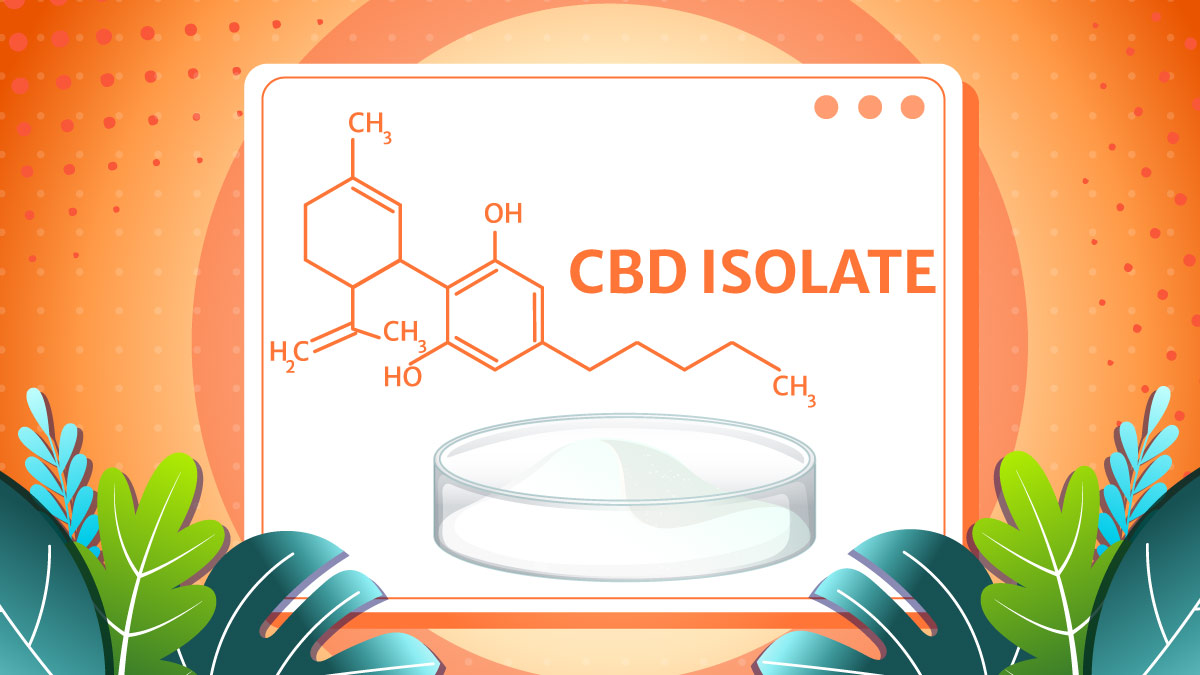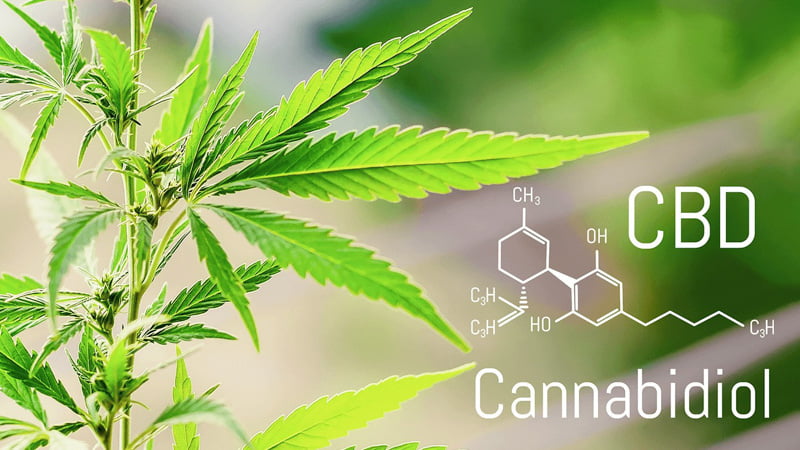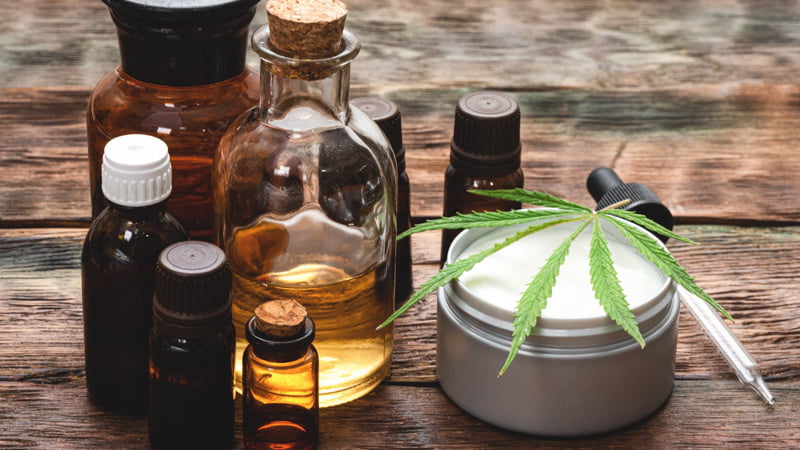What is CBD Isolate? Uses, Health Benefits, Effects

In short, CBD isolate is a pure extract that contains cannabidiol without any additional cannabinoids or terpenes.
There’s much more to it than that, though.
This article will look at what CBD isolate is, how it compares to other extracts, and how it can benefit you.
What is CBD Isolate?
CBD isolate, unlike full and broad spectrum CBD, is a pure extract of the cannabinoid cannabidiol (CBD). Isolate products contain only cannabidiol without any other cannabinoids and terpenes naturally found in the hemp plant.
CBD isolates are great for people that want to try CBD but don’t want to ingest the psychoactive cannabinoid THC. If you’ve had bad experiences with full or broad spectrum CBD products, isolates may be what works for you.
Isolates work by influencing cannabinoid receptors in the body’s endocannabinoid system. When CBD interacts with these receptors, it can influence many different bodily functions.
The Benefits of CBD Isolate
 When CBD isolate is used, it can affect the body in many ways.
When CBD isolate is used, it can affect the body in many ways.
CBD specifically interacts with the CB1 and CB2 receptors in the endocannabinoid system [1]. The interaction with this complex cell signaling system can benefit people in several ways:
1. CBD Eases Anxiety, Depression, and Stress
CBD has excellent benefits on the mind. Several studies have shown that CBD alone may ease anxiety, depression, stress, and even PTSD in some people.
One 2011 study looked into CBD’s effects on people with SAD (seasonal affective disorder) [2]. SAD is a type of depression that sufferers experience through the winter months when it’s cold, wet, and dark.
People with SAD can experience sadness, lack of motivation, social anxiety, and unwarranted stress. When patients were administered 400-milligrams of CBD, they reported that overall anxiety levels were reduced.
Patients also reported a sense of calm and an uplifted feeling after consuming CBD.
2. CBD Provides Pain-Relief
CBD has pain-relieving qualities.
The cannabinoid has the potential to relieve symptoms in people with chronic pain conditions. In fact, several studies have provided evidence that CBD can ease the pain when ingested and used directly on the skin as a topical.
CBD alone has excellent pain-relieving qualities so that isolates can be an effective treatment for pain conditions. However, one study suggested that CBD worked best when used alongside other cannabinoids like CBC, CBG, or THC rather than its own [3].
This could mean that full-spectrum CBD products are more effective in the treatment of pain. That’s not to say Isolates aren’t effective, though, just not quite as strong as full-spectrum.
3. CBD is an Anti-Inflammatory
Studies show that CBD has anti-inflammatory properties [4].
Research has discovered that CBD can relieve inflammation and pain in people with inflammatory conditions when used in topical and ingested forms.
With the potential to relieve arthritis, psoriasis, dermatitis, acne, and much more, the anti-inflammatory benefits of CBD are valuable to a wide group of people.
4. CBD May Alleviate Nausea
There’s limited scientific evidence that proves CBD is an effective anti-nausea drug. However, there is a lot of anecdotal evidence to suggest it’s effective.
Some cancer patients use CBD to reduce nausea and other side effects of cancer treatments and therapies with excellent results.
One study from 2011 suggests CBD can help with nausea due to its interaction with serotonin receptors [5]. The study involved animal testing and found that their nausea response was greatly reduced when CBD was administered to rats.
5. CBD Has Neuroprotective Properties
CBD’s interaction with the endocannabinoid system and other signaling systems in the brain may suggest that it’s an effective treatment for neurological disorders.
CBD’s neuroprotective benefits have been widely studied in epilepsy and multiple sclerosis patients.
One study found that CBD and other cannabinoids (including THC) reduced spasms in patients with multiple sclerosis [6].
It’s important to note that most of the studies exploring the neuroprotective benefits of CBD have involved full-spectrum CBD products with 0.03% THC (sometimes more). This could indicate that CBD isolates aren’t as useful for treating neurological disorders.
6. The List Goes on…
Numerous studies have looked into CBD as a potential treatment for all manner of health issues.
Although research in some areas is still in its early days, CBD has huge potential. Below is a list of some of the health conditions CBD may be able to treat:
- Cancer Symptoms
- Epilepsy
- Multiple sclerosis
- Asthma
- Arthritis
- Skin conditions
- Diabetes
- Heart conditions
- Obesity
- Mental health issues
- Hypertension (High blood pressure)
- Addiction & dependence
- Insomnia & sleep-related disorders
CBD Isolate: How It’s Made?
So, how is CBD isolate made?
There’s no specific extraction process to produce CBD isolate. However, most manufacturers use one of two methods — CO2 extraction or ethanol extraction.
Both processes are relatively simple.
Simplicity aside, to produce a 100% pure product, a lot of skill is needed alongside a laboratory full of expensive equipment.
One final step is needed to separate the CBD from the other cannabinoids and terpenes present. This step is called winterization.
Let’s take an in-depth look into the production steps of pure CBD isolate:
1. CO2 Extraction
CO2 extraction is arguably the most efficient way of extracting CBD. When done properly, it’s the cleanest extraction method and leaves the least amount of residual chemicals.
CO2 kept under high pressure is used to extract all of the cannabinoids and terpenes from the raw hemp flower.
The CO2 is blasted through a machine that holds the raw flower in the path of the gas. A liquid is collected below that contains the CBD, still with all the other cannabinoids present.
The excess liquid is then evaporated to leave a pure cannabinoid extract behind in the form of oil. Left at this stage, the oil is full-spectrum.
2. Ethanol Extraction
Ethanol extraction uses pure alcohol to extract CBD and other cannabinoids from the raw hemp flower.
When the plant matter is suspended in the solvent, it releases cannabinoids, terpenes, and other compounds in the hemp plant’s makeup. The plant material is strained off, and a cannabinoid-infused liquid is left behind.
From here, the excess alcohol is evaporated to leave a residual cannabinoid oil behind. Left at this stage, the oil is full-spectrum.
3. Winterization
Once the cannabinoids have been extracted using either CO2 or ethanol extraction, the CBD must be separated from the other cannabinoids in the oil. As mentioned, after extraction is full-spectrum, the oil left behind, so to turn it into a CBD isolate, this final step is essential.
To do this, manufacturers use a process called winterization.
The cannabis oil (with all cannabinoids present) that has been extracted using the methods above is suspended in a solvent.
The solvent is then frozen until a pure CBD isolate powder that contains no other cannabinoids is separated.
This powder is then collected, and the rest of the extraction is discarded.
From here, the powder can then be dissolved in a beneficial oil, used in edibles, capsules, topicals, or kept in its raw form to use as a supplement for food and drinks.
Is CBD Isolate Better Than Full & Broad Spectrum CBD?
Research suggests that full- and broad spectrum CBD is a more valuable treatment for a wider range of health conditions [7].
It’s believed that CBD is more effective when consumed alongside other cannabinoids. A full cannabinoid profile is more efficient than singular cannabinoid extractions. This phenomenon is known as the entourage effect.
That being said, CBD isolates still have excellent potential in the health space.
Many studies have been done on pure CBD isolates, and although the conclusion that full-spectrum oils are better, isolates are still effective in treating some conditions.
You may prefer to use a CBD isolate because you want to avoid THC and other cannabinoids entirely. Perhaps you react badly to some other cannabinoids or would prefer to steer clear of full-spectrum products for other reasons.
There are pros and cons to using CBD isolates, just as there are for full- and broad spectrum products.
Let’s take a look at a few of them:
CBD Isolate: Pros & Cons
Pros:
- Contains only CBD
- Plenty of product variety
- No risk of showing up on a drug test
- Suitable for people with adverse reactions to other cannabinoids
- Raw oil tastes less than full & broad spectrum CBD oil
Cons:
- No entourage effect
- May not be a suitable treatment for some condition
Full-Spectrum CBD: Pros & Cons
Pros:
- Full entourage effect
- Wide product variety
- Can treat a range of health conditions
Cons:
- May show up on drug tests as it contains trace amounts of THC
- Not suitable for people that react to certain cannabinoids or terpenes
- Raw oil has a taste that’s unappealing to some
Broad Spectrum CBD: Pros & Cons
Pros:
- Has the entourage effect to some extent (minus the THC)
- Wide product variety
- Effective for multiple health issues
- Doesn’t show up on drug tests
Cons:
- Doesn’t have the full entourage effect
- Raw oil has an unappealing taste to some
How to Use CBD Isolate?
 There are several ways to use CBD isolate.
There are several ways to use CBD isolate.
There is a way to use CBD isolates for everyone, from oils and edibles to topicals and vapes. How you consume CBD is purely down to you, but the most bioavailable methods are oils and vapes.
1. CBD Isolate Oil
CBD oil is the most available form of CBD isolates available.
It can be administered using a dropper to apply small amounts of the oil under the tongue. Drops can also be added to food and drinks.
CBD oil is excellent if you want to monitor your dosages closely. It gives you ultimate flexibility over your dosage because you can adjust the amount of oil taken by dropping more or less oil under the tongue.
Although you get great flexibility with dosages by using CBD oil, it isn’t easy to accurately administer a specific dose as well as you would with edible products.
2. CBD Edibles
CBD edibles come in many forms. They provide you with a tasty way to consume pure CBD accurately.
Each CBD edible — such as a gummy, honey stick, or lollypop — has a precise dose of CBD.
Potencies can vary between products — however, if you purchase a pack of gummies, you can be certain that every piece in the pack has the same amount of CBD.
Edibles are excellent if you hate the taste of raw CBD isolate oil but want to consume the cannabinoid orally. They’re also perfect if you’re concerned about how much CBD you’re consuming and want to monitor your dosages closely.
3. CBD Isolate Capsules
CBD Capsules have an accurate dose of CBD inside each pill-shaped capsule.
Capsules come in dry and soft gel forms. Both are taken as you would with any other pill-form medication, supplement, or vitamin.
Like edibles, capsules give you great control over the dose. Each capsule is loaded accurately with the amount of CBD stated by the manufacturer.
They’re great if you want a completely tasteless way to consume CBD while having complete control over the amount you’re consuming.
4. CBD Topicals
CBD topicals come in many forms. Unlike the previous three consumption methods, topicals are not consumed orally.
You’ll find creams, balms, and gels that can be applied to the skin to reduce pain and inflammation. You will also find bath bombs, soaps, roll-ons, and much more.
Topicals are great if you’re suffering from a skin condition such as eczema, acne, or psoriasis. Used in conjunction with an orally consumed form of CBD allows you to combat an inflammatory disorder or skin condition from two angles.
5. CBD Vaporizers
Vapable CBD isolate is an extremely effective way to consume CBD. The cannabinoid is absorbed in the lung tissue much more efficiently when inhaled as opposed to eating.
The biggest worry when using vapable CBD is the potential damage to the lungs. Although vaping is much healthier than smoking, it’s unclear what the health implications are.
It’s also not advisable to use CBD vaporizers if you suffer from a respiratory issue such as asthma.
Possible health risks aside, vaping CBD is a highly bioavailable way to consume CBD. It’s a great way to use CBD if you’re suffering from stress, anxiety, or depression.
Can You Make Anything With CBD Isolate?
Depending on the type of CBD isolate you have, you can make various edibles and topicals at home.
CBD oil can be used in your daily diet. You can mix it with your morning coffee, your lunchtime sandwiches, or your evening dinner.
If you want to get a bit more creative, you can have a go at baking your own CBD edible snacks or making gummies, jellies, and other sweet treats.
You can also make your own topicals from CBD oil. Using normal moisturizing creams, balms, and soaps, you can mix in high-potency CBD oil to create your own topicals.
Making topicals is perfect if you want to turn your favorite cream or balm into a medical product. If your skin is super-sensitive and you have a specific cream that works for you, this is a great way to apply your CBD topically without risking a flare-up.
Final Thoughts: Is CBD Isolate Worth Your Time?
CBD isolate isn’t as valuable medically as full and broad spectrum CBD.
That doesn’t mean it’s useless, though.
CBD isolates are perfect for people who negatively react to other cannabinoids but still want to try CBD to treat their condition.
This article should have given you everything you need to know about CBD isolate, but to recap, here are a few bullet points to summarize:
- CBD Isolate contains CBD without any other cannabinoids or terpenes
- CBD has many benefits but isn’t as valuable as full- and broad spectrum products
- CBD isolates come in many forms, from oils & topicals to vape liquids & edibles
- CBD isolates will not show up on drug tests
- CBD is extracted using CO2 or ethanol & further processed during winterization
References Used In This Article
- Pgacher, P., Bátkai, S., & Kunos, G. (2006). The endocannabinoid system is an emerging target of pharmacotherapy. Pharmacological Reviews, 58(3), 389-462.
- Crippa, J. A. S., Derenusson, G. N., Ferrari, T. B., Wichert-Ana, L., Duran, F. L., Martin-Santos, R., … & Hallak, J. E. C. (2011). Neural basis of anxiolytic effects of cannabidiol (CBD) in generalized social anxiety disorder: a preliminary report. Journal of psychopharmacology, 25(1), 121-130.
- Russo, E. B. (2008). Cannabinoids in the management of difficult-to-treat pain. Therapeutics and clinical risk management, 4(1), 245.
- Atalay, S., Jarocka-Karpowicz, I., & Skrzydlewska, E. (2020). Antioxidative and anti-inflammatory properties of cannabidiol. Antioxidants, 9(1), 21.
- Parker, L. A., Rock, E. M., & Limebeer, C. L. (2011). Regulation of nausea and vomiting by cannabinoids. British journal of pharmacology, 163(7), 1411-1422.
- Flachenecker, P., Henze, T., & Zettl, U. K. (2014). Nabiximols (THC/CBD oromucosal spray, Sativex®) in clinical practice-results of a multicenter, non-interventional study (MOVE 2) in patients with multiple sclerosis spasticity. European neurology, 71(5-6), 271-279.
- Russo, E. B. (2019). The case for the entourage effect and conventional breeding of clinical cannabis: no “strain,” no gain. Frontiers in plant science, 9, 1969.